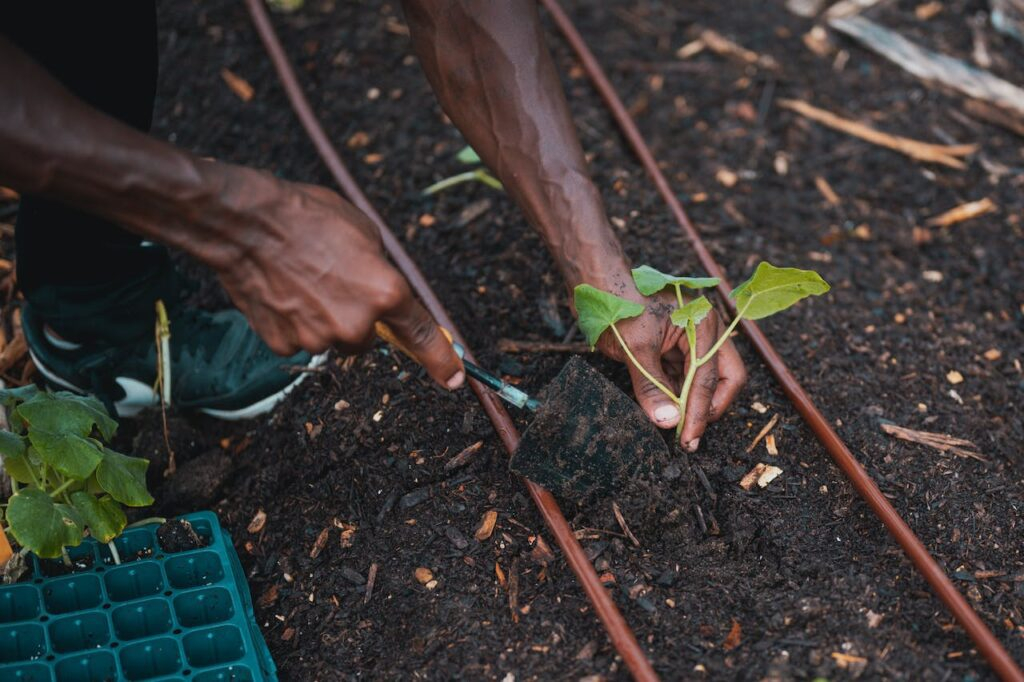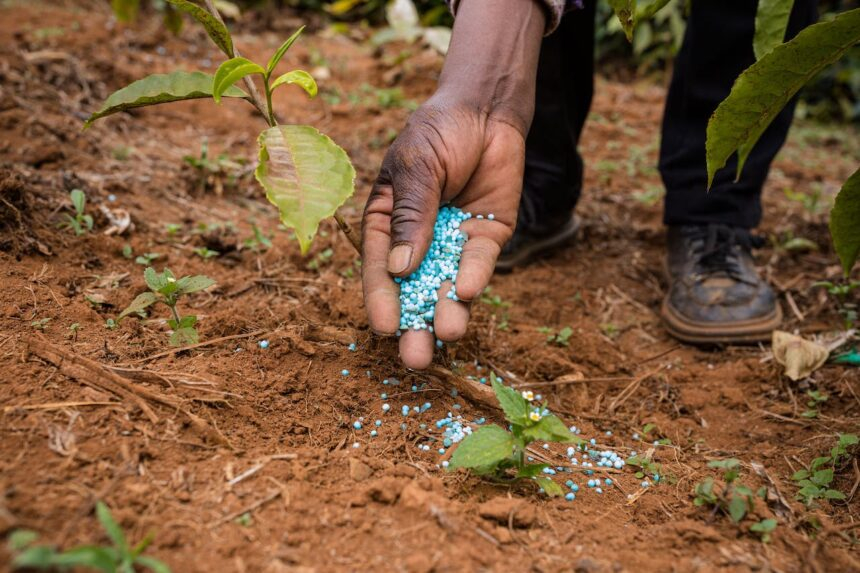Having a thriving garden starts from the ground up. Choosing the Perfect Soil Fertilizer and Mulch lays the foundation for healthy plants and bountiful harvests. This guide will help you understand how to select the ideal materials to feed your garden and retain moisture.
Assess Your Existing Soil Fertilizer and Mulch
The first step is to analyze the soil currently in your landscape beds or vegetable garden. Here are some things to evaluate:
Texture
- Clay soils have tiny, dense particles that cling together and resist water penetration.
- Sandy soils have large particles that don’t adhere well and drain rapidly.
- Loamy soils are an ideal blend of sand, silt, and clay that provide nutrients, drainage, water retention, and space for roots to grow.
Structure
- Grab a handful and see if the soil clumps together crumbles apart easily, or refuses to form a ball. Good garden soil should clump slightly but break up with pressure.
Drainage
- Dig a hole 12 inches deep and fill it with water. If it drains fully within an hour your drainage is excellent. Standing water after 12 hours indicates poor drainage.
pH balanced
- Test kits are available to measure if your soil is too acidic or alkaline. Most plants thrive in slightly acidic soil with a pH of 6.0-7.0. Extreme high or low pH makes nutrients unavailable to plant roots.
Enhance Your Soil Fertilizer and Mulch Texture and Structure
Here are some amendments you can mix into your existing soil to create an optimal composition and texture:
Compost
Compost introduces nutrients and beneficial microbes that help plants extract minerals from the soil. Well-decomposed compost adds organic matter to improve moisture retention and drainage in sandy or clay soils. Spread 1-3 inches over the bed and mix into the top 6 inches of native soil.
Manure
Manure boosts soil fertility and provides an extended-release of nitrogen and other nutrients. It also encourages biological soil activity. Mix aged, dried manure into vegetable and flower gardens in early spring at the rate of 1 to 2 pounds per 10 square feet.
Peat Moss
Peat moss lightens heavy clay soils to allow better oxygen circulation to the roots. It also helps sandy soils retain water and nutrients longer. Incorporate a 1-inch layer into the soil surface before planting and supplement annually.
Biochar
This charcoal soil amendment improves drainage and aeration while increasing the soil’s ability to capture and hold both water and dissolved nutrients. Mix biochar into potting soil or work it into garden beds at least 8 inches deep before planting.
Choose Fertilizers for Specific Needs
While building healthy garden soil supplies basic nutrients, most plants need an extra feeding boost. Consider the following options tailored to specific requirements:
Compost Tea
This mild liquid fertilizer introduces beneficial microbes and stimulates soil life. Compost tea promotes vigorous root growth and releases phosphorus, potassium, and trace minerals over time. Spray over leaves or soak the soil monthly through the growing season.
Granular Fertilizer
An all-purpose granular fertilizer with equal parts nitrogen, phosphorus, and potassium provides balanced nutrition. Scatter per package directions in early spring and cover lightly with soil. As the pellets dissolve, rain carries the nutrients to plant roots. Reapply midway through the growing season.
Manure Tea
Steeping aged manure in water releases a high concentration of nitrogen along with other key nutrients. Manure tea is an excellent fertilizer for heavy-feeding vegetables like tomatoes, peppers, and corn. Drench the soil around each plant, beginning when the first fruits are set.
Bone Meal
This slow-release source of phosphorus and calcium is ideal for root crops like carrots and potatoes. Work bone meal into the soil 2-4 weeks before planting seeds or transplants. It also helps establish perennials like fruit trees, berry bushes, and ornamental flowers.

Choose the Right Mulch
Spreading mulch over exposed soil conserves moisture, controls weeds, and moderates soil temperature. Consider these options:
Wood Chips
Shredded hardwood mulch breaks down slowly to improve soil texture. A 3-4 inch layer minimizes weed growth and reduces watering needs. Replenish as the mulch decomposes. Avoid using unaged wood chips that draw nitrogen from the soil as they decompose.
Grass Clippings
This free and readily available mulch adds nitrogen to the soil as it decomposes. Grass clippings also provide effective weed suppression but decompose rapidly so they must be replenished several times per season. Never apply clippings more than an inch deep at a time.
Shredded Leaves
Use shredded leaves from your own landscape to create a self-renewing supply of mulch. Add a 2-3 inch layer around plants to reduce soil evaporation and improve biological activity. Shredded leaves break down quicker than other woody mulches.
Straw
Straw makes an affordable organic mulch that blocks light to prevent weed germination and seedling development. It also protects soil structure when temperatures fluctuate. Apply 3-6 inches of straw around plants, leaving space near stems and trunks. Expect to replenish straw mulch 1-2 times per season.
Conclusion
Amending your native soil with compost and fertilizers tailored to your plants’ needs gives them a nutritious, welcoming growing environment. Spreading mulch over the enriched soil protects your investment by conserving moisture, suppressing weeds, and minimizing temperature swings. Follow these tips and you’ll be rewarded with a vibrant, thriving garden.
Frequently Asked Questions on Choosing Soil, Fertilizer, and Mulch
How do I choose the right soil?
Look for loamy soil with good drainage and plenty of organic matter. The ideal soil is slightly acidic with a pH between 6.0-7.0. Test your soil texture and structure before amending with compost or other materials.
What type of soil is best for gardens?
The best soil for gardens is loam – a mix of sand, silt, and clay particles that retain moisture but drain well and provide space for roots to spread. Loamy soil is nutrient-rich and teeming with beneficial microorganisms.
What is the best soil for garden beds?
The best soil to fill garden beds is a loam enriched with 1-3 inches of aged compost till into the top 6 inches to provide essential nutrients and improve drainage in clay soils or water retention in sandy soils.
How do I choose the right fertilizer?
Select fertilizers that provide nutrients tailored to your plant’s needs in a form your soil type can hold. Slow-release organic fertilizers feed plants over longer periods while synthetic fast-acting ones provide an immediate but shorter boost.
Which fertilizer is best for the garden?
Choose a balanced all-purpose organic or synthetic fertilizer with equal parts nitrogen, phosphorus, and potassium listed as the NPK ratio on the label. Apply early in the growing season and supplement midway through.
How do I choose NPK fertilizer?
Match the optimal NPK ratio for what you are growing, for example, 5-10-10 for vegetables and annuals, 9-15-30 for blooming plants, and 3-4-3 or 4-6-2 for general landscape maintenance.
What makes the best mulch for the garden?
The best mulch insulates the soil, reduces moisture loss through evaporation, limits weed growth, and replenishes the soil as it decomposes. Fine shredded bark and wood chips are excellent mulch materials for ornamental beds while straw, leaves, and hay work better in vegetable gardens.
Which color mulch is best?
Dark brown or black colored mulches are best as they absorb heat to warm the soil and facilitate nutrient exchange. Light, reflective mulches help moderate soil temperatures in hot climates. Organic mulches made from wood or plant materials naturally darken as they decompose.
Is mulch the same as compost?
Mulch and compost both enrich the soil but serve different primary purposes. Compost boosts nutrient content and soil structure when mixed into beds. Mulch layers atop the soil retard weeds and retain moisture without needing to be tilled in.









